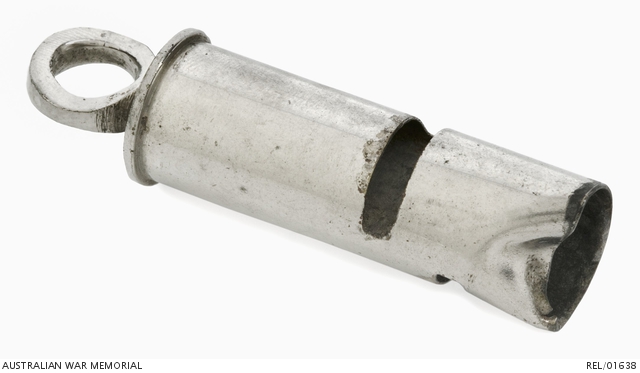| Places | |
|---|---|
| Accession Number | REL/01638 |
| Collection type | Heraldry |
| Object type | Heraldry |
| Physical description | Lead, Nickel-plated brass |
| Maker |
Coney and Co |
| Place made | United Kingdom: England, West Midlands, Birmingham |
| Date made | before 1910 |
| Conflict |
Period 1920-1929 First World War, 1914-1918 |
Damaged whistle found at Lone Pine : N Burrows, British Army of the Black Sea

Nickel-plated brass tube whistle, supplied with a integral suspension loop at one end, and a pair of opposing rectangular window notches at the other end, each fitted with a lead fipple. The name 'CONEY'S ALARM' is impressed into the whistle barrel. This end has suffered impact damage, and the mouthpiece is completely missing. The nickel finish is scratched while sections of the plating have worn through from use.
Tube whistle, branded 'Coney's Alarm', damaged and bent by an impact strike at the mouthpiece end. This whistle was discovered in the 'ANZAC Lines' at Lone Pine by Mr N Burrows, a veteran of the British Army of the Black Sea. Burrows served with this force from 1920 to October 1923 when it occupied areas around Constantinople to influence control over shipping lanes between the Black Sea and the Aegean when tensions between Turkey and Greece were high. The increase in tensions led to a corresponding increase in the British Force in an attempt to influence the situation, but which exacerbated Turkish resentment. The mission essentially failed and led to the British Prime Minister being ousted from office.
Burrows recovered other material from the Australian areas of the Gallipoli Peninsula on a tour of the area in about 1920. They include a damaged penny (REL/01639) found near Chunuk Bair and hat and collar badges from trench positions (REL/01640).
'Coney's Alarm' was made by Coney and Company of Birmingham, a manufacturer which was purchased by John Hudson's in 1910. They continued production of this pattern whistle for the duration of the First World War, but the presence of the Coney name indicates manufacture prior to 1910.